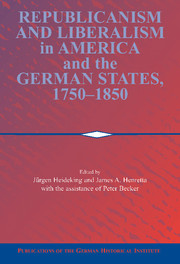Book contents
- Frontmatter
- Introduction
- PART I OVERVIEW
- 1 “Wir nennen’s Gemeinsinn” (We Call It Public Spirit): Republic and Republicanism in the German Political Discussion of the Nineteenth Century
- PART II THE REPUBLICAN WORLD
- PART III THE TRANSITION FROM REPUBLICANISM TO LIBERALISM
- PART IV THE LOGIC OF LIBERALISM
- Index
1 - “Wir nennen’s Gemeinsinn” (We Call It Public Spirit): Republic and Republicanism in the German Political Discussion of the Nineteenth Century
Published online by Cambridge University Press: 05 January 2013
- Frontmatter
- Introduction
- PART I OVERVIEW
- 1 “Wir nennen’s Gemeinsinn” (We Call It Public Spirit): Republic and Republicanism in the German Political Discussion of the Nineteenth Century
- PART II THE REPUBLICAN WORLD
- PART III THE TRANSITION FROM REPUBLICANISM TO LIBERALISM
- PART IV THE LOGIC OF LIBERALISM
- Index
Summary
Karl August Varnhagen von Ense recounts a conversation that took place between Baron Karl vom Stein and the Silesian Count Gustav von Schlabrendorf in 1814 or 1815 in Paris. When Schlabrendorf asked whether Stein was traveling to Vienna on matters of public service, Stein replied that this was impossible because he served no man. “Because you serve everyone,” countered Schlabrendorf. He added, “that is a republican attitude that you may have a lot of use for in Germany.” Stein replied: “But we don't want a republic in Germany.” However, when Schlabrendorf dropped the term republic but insisted that no state could survive without a “republican attitude,” Stein agreed with the proviso: “But we have another name for it; we call it public spirit” (Gemeinsinn).
Just a few words in a casual conversation give us the specific dimensions of one of the dominant lines of political thought in Germany in the first half of the nineteenth century. The republic as a form of government was rejected, but there was demand for a political attitude that Stein did not want to call “republican” but to which he ascribed an analgous meaning. To be sure, Stein, an opponent of both monarchical absolutism and democratic republicanism, was aware of the differences between Schlabrendorf ’s understanding of “republicanism” and his own of “public spirit,” but he assumed a basic identity of intention and mentality that is manifest in the readiness of people to contribute to the common weal of the society (res publica) in which they live. Stein was convinced that this “public spirit” could also exist outside a republic. The reforms he introduced in Prussia were intended to lay the foundation for the public spirit, partially by the reactivation of preabsolutist traditions of “local self-government,” partially by breaking outdated personal and economic ties, and partially through patriotic education.
- Type
- Chapter
- Information
- Publisher: Cambridge University PressPrint publication year: 2002
- 2
- Cited by



